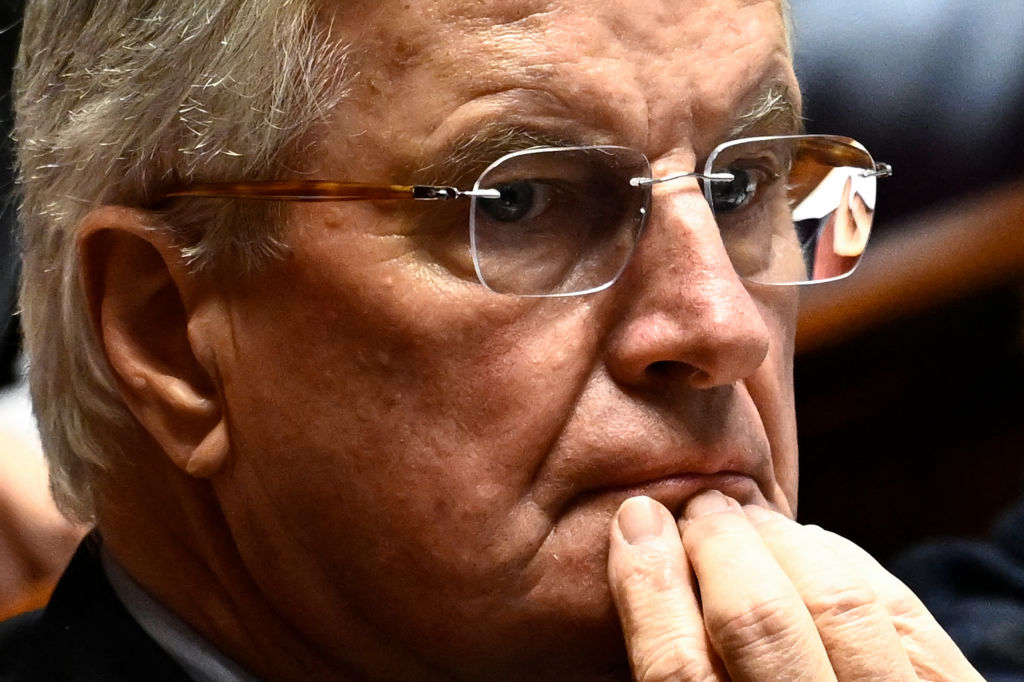Michel Barnier’s government is likely to be toast by teatime when a vote of no confidence is tabled in France’s National Assembly.
Votes will be cast this afternoon in a motion brought by the left-wing New Popular Front coalition, but Marine Le Pen’s National Rally have vowed to endorse it and so put an end to Barnier’s three months in office.
Instead of addressing the reasons why the No vote won, the elite – Barnier included – not only ignored their anxiety but subverted democracy
The budget for 2025 has brought to the head the simmering discontent felt by Le Pen for Barnier’s centrist government. In a series of posts on social media on Tuesday, Le Pen explained why she was ready to support the vote of no confidence. ‘With Michel Barnier’s appointment, the French were looking for a calming influence on our institutions, a vision for the country and hope for recovery,’ she said. ‘By incorporating his budget in the catastrophic continuity of Emmanuel Macron, the Prime Minister could only fail.’
Barnier and Macron spoke to the media on Tuesday, criticising Le Pen’s stance and accusing her of endangering the Republic. Macron also mocked suggestions he was thinking of resigning. ‘I was elected twice by the French people,’ he said. ‘I am extremely proud of this, and I will honour their trust with all my energy until the very last second of my term to serve the country.’
Another prominent figure who joined the attack on the National Rally was the Interior Minister, Bruno Retailleau, who, as I wrote in October, swiftly established himself as a potential presidential threat to Le Pen with his pledges to crack down on immigration and insecurity. There are some reports in the French media that claim Retailleau’s rising popularity is another factor for Le Pen’s decision to terminate Barnier – and with him Retailleau. The longer he was in office, the more successful he might be in restoring order to France’s porous borders and lawless inner cities.
Retailleau was interviewed on the radio on Wednesday morning, and again denounced the decision of Le Pen, expressing his astonishment that she was willing to ally herself with Jean-Luc Melenchon’s la France Insoumise, a party in favour of mass immigration and with links to some dubious Islamists.
‘For me,’ said Retailleau, ‘politics is about conviction and there is nothing worse in politics than voting against one’s convictions’.
Retailleau, a practising Catholic opposed to gay marriage, is indeed a man of conviction, but he is in the minority in the National Assembly. There are few principles across the political spectrum, and that applies to Barnier, who for all his gentlemanly manners, was part of great EU betrayal of 2005.
That year the French people were asked to vote in a referendum on the EU Constitution. Barnier, then Minister of Foreign Affairs, was at the forefront of the ‘Yes’ campaign, but he ended up on the losing side, as did nearly every member of the French elite, as the ‘Nos’ triumphed with 55 per cent.
It was put to Barnier the day after the referendum, that the vote reflected a ‘deeply divided’ country, where 80 per cent of people in Neuilly (the most affluent district of Paris) voted ‘Yes’ and 60 per cent of people in rural Picardy voted ‘no’. The interviewer wondered if this didn’t expose ‘a real problem in France today.’
Barnier agreed. ‘There’s social concern, anxiety, the high cost of living, the lack of work, there’s the sense of the European project that we’ve lost,’ he said. ‘We need to talk about it more normally. This is a question of democracy and I think it was good that this referendum brought out this need.’
That never happened. Instead of addressing the reasons why the No vote won, the elite – Barnier included – not only ignored their anxiety but subverted democracy by conniving with the EU to ratify the Constitution as the repackaged Lisbon Treaty. On this occasion the people were denied a vote.
This betrayal has never been forgiven by Jean-Luc Melenchon who was a prominent ‘no’ campaigner, or by Marine Le Pen, whose father, Jean-Marie – then the leader of the National Front, as the National Rally was called at the time – was another significant member of the No camp.
Retailleau was among the minority of centre-right politicians who voted against the Constitution. He probably knows that when he lectures Le Pen about convictions he is wasting his breath. Why should she help save Barnier after what he did in 2005?
Nearly 20 years later, France is still bedevilled by ‘social concern, anxiety, the high cost of living, the lack of work’ and the EU is largely to blame. Barnier and the rest of the Paris elite ignored the cry of distress from the people in 2005 – so why should Le Pen and Melenchon respond to his now?








Comments